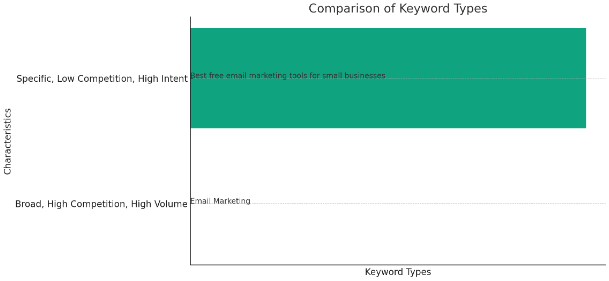Table of Contents
Mastering Keyword Research Techniques for SEO Success
Introduction
Keyword research is the cornerstone of successful SEO strategies. It’s a process that involves identifying popular words and phrases people enter into search engines. These insights can help inform content strategies, marketing campaigns, and even business decisions. As the digital landscape becomes more competitive, mastering advanced keyword research techniques is crucial for any digital marketer, SEO professional, or content creator.
Section 1: The Essentials of Keyword Research
Understanding the Basics
Keyword research is more than just finding words with high search volumes; it’s about understanding the language your potential customers are using. It involves delving into the minds of your audience to understand their needs, questions, and pain points. This foundational step in SEO allows you to align your content with user intent, making it more likely to be seen and engaged with. For a deeper understanding of the SEO landscape, explore What is HubSpot, a comprehensive guide on a leading digital marketing platform.
The Role of Relevance and Authority
Relevance and authority are two pillars of effective keyword research. Google ranks content that is not only relevant to the user’s query but also authoritative. This means that your content should not only match the keyword but also provide comprehensive and valuable information on the topic. For real-world examples of how relevance and authority play out in content creation, check out our diverse range of articles in our Blog.
Section 2: Advanced Keyword Research Techniques
Leveraging LSI Keywords
Latent Semantic Indexing (LSI) keywords are crucial for clarifying the context of your content. They help search engines understand the topic and context of your content, differentiating it from other pages with similar keywords. For instance, if your article is about ‘cars’ as vehicles, using words like ‘vehicle’, ‘buy’, or ‘new’ can help distinguish it from other meanings like the movie or the band.
Niche Analysis for Keyword Discovery
Understanding your niche is key to generating relevant and original keyword ideas. This involves studying the places where your target audience hangs out, like industry forums, social media groups, and Q&A sites. For insights on effective niche analysis and how it influences email marketing strategies, explore 3 Best Free Email Marketing Tools and Services.
Section 3: Innovative Tools and Methods
Exploring Keyword Research Tools
In the realm of SEO, various tools have been developed to aid in keyword research. These tools not only provide lists of potential keywords but also offer insights into metrics like search volume, competition level, and more. Here are some prominent tools:
| Tool | Description |
|---|---|
| Google Keyword Planner | Ideal for getting search volume data and keyword ideas directly from Google. |
| Ubersuggest | Provides an overview of search volume, competition, and even suggests content ideas. |
| Keyword Tool.io | Offers extensive keyword suggestions, including questions and prepositions related to your seed keywords. |
For more advanced insights into email marketing tools, refer to ActiveCampaign vs TinyEmail.
Competitive Analysis for Keywords
Competitive analysis is a powerful technique in keyword research. By analyzing your competitors’ websites, you can uncover the keywords they are ranking for, giving you valuable insights into potential keyword opportunities. To understand the dynamics of competition in digital marketing, delve into Shopify vs ClickFunnels: Best Digital Marketing.
Section 4: Application of Keyword Research in SEO Strategy
Integrating Keywords into Content
Successfully incorporating keywords into web content is an art. It’s about balancing keyword density with natural, engaging writing. Here are some key strategies:
- Use keywords in headings and subheadings for better SEO structuring.
- Include keywords naturally in the first 200 words of your content.
- Utilize synonyms and related phrases to avoid repetition and enhance readability.
Discover how these strategies are applied in real-world scenarios by exploring Comprehensive Wishpond Review.
Balancing Volume and Competition
The effectiveness of a keyword is often a balance between its search volume and the competition it faces. Understanding this balance can guide your keyword selection process:
- High Volume, High Competition: These are often short-tail keywords that are broad and highly sought after.
- Low Volume, Low Competition: These long-tail keywords are more specific and can drive targeted traffic.
Section 5: Beyond Basic Keyword Research
Understanding Search Intent
Search intent is the ‘why’ behind a search query. It’s crucial to understand what your audience is looking for:
- Informational: Seeking information or answers.
- Navigational: Looking for a specific website or page.
- Transactional: Intending to complete an action or purchase.
For a practical application of understanding search intent in a learning management system, check out TalentLMS.
Continuous Adaptation and Learning
SEO is an ever-evolving field, requiring continuous learning and adaptation. Stay updated with the latest trends and algorithm updates to refine your keyword strategy constantly.

Advanced Tactics in Keyword Research
Expanding beyond the basics, advanced tactics in keyword research can significantly enhance the effectiveness of your SEO strategy.
Long-Tail Keywords: The Hidden Gems
Long-tail keywords are specific, often longer phrases that are less competitive but highly targeted. They offer a higher conversion rate due to their specificity. Here’s how they compare to short-tail keywords:
| Keyword Type | Characteristics | Example |
|---|---|---|
| Short-Tail | Broad, high competition, high volume | “Email Marketing” |
| Long-Tail | Specific, low competition, lower volume but high intent | “Best free email marketing tools for small businesses” |
Semantic Search: Understanding User Intent
Semantic search is about understanding the intent and contextual meaning of search terms. It’s crucial to align your content with the intent behind the search queries. This involves:
- Creating content that answers specific questions.
- Providing comprehensive information that encompasses various aspects of the topic.
The Power of Keyword Clustering
Keyword clustering is grouping similar keywords and creating content that targets multiple related keywords. This approach can increase your content’s relevance for a set of keywords, improving its ranking potential.
Section 6: Analyzing and Refining Your Keyword Strategy
Tracking Keyword Performance
It’s essential to monitor the performance of your chosen keywords. Tools like Google Analytics and SEMrush can provide insights into how your keywords are performing in terms of ranking, traffic, and conversions.
Adjusting Your Strategy
Based on the performance data, you may need to adjust your strategy. This could involve focusing on different keywords, tweaking your content, or even revising your overall SEO approach.
Section 7: Future Trends in Keyword Research
AI and Machine Learning in SEO
The role of AI and machine learning in SEO is growing. These technologies can help predict trends, understand user behavior, and even suggest content optimizations.
Voice Search Optimization
With the rise of digital assistants, optimizing for voice search is becoming increasingly important. This involves focusing on natural language and question-based queries.
Integrating SEO with Overall Marketing Strategy
Effective keyword research should be integrated with your broader marketing strategy, ensuring consistency and synergy across all channels.
Conclusion
Keyword research is an ongoing process that requires adaptation and refinement. By staying abreast of the latest trends and continuously monitoring your keyword performance, you can ensure that your SEO strategy remains effective and relevant.
For more information on crafting an effective digital strategy, visit our About Us page. Also, ensure your activities align with best practices as outlined in our Privacy Policy.
Recap and Final Insights
As we wrap up our comprehensive guide on mastering keyword research techniques for SEO success, let’s revisit the key points and add some final insights to ensure your keyword strategy is robust and effective.
Key Points Recap
- Fundamentals of Keyword Research: Understanding the basics, including relevance, authority, and the role of LSI keywords.
- Advanced Techniques: Leveraging tools, competitor analysis, and incorporating long-tail keywords.
- Application: Integrating keywords into your content strategically and balancing search volume with competition.
- Beyond Basics: Embracing advanced tactics like semantic search, keyword clustering, and understanding user search intent.
- Future Trends: Preparing for the integration of AI and machine learning in SEO and the growing importance of voice search optimization.
Final Insights
Holistic SEO Strategy
While keyword research is crucial, it’s part of a larger SEO and marketing strategy. Integrating keyword research with other SEO elements like link building, technical SEO, and quality content creation is vital for overall success.
Evolving with SEO Trends
The digital landscape is continuously evolving. Staying updated with the latest SEO trends, algorithm updates, and adapting your keyword research accordingly is crucial for maintaining a competitive edge.
Measuring Success
Regularly track and analyze the performance of your keywords. Use analytics to understand traffic trends, keyword rankings, and user engagement, and adjust your strategy as needed.
Continuous Learning and Growth
SEO is a field of continuous learning. Engage with SEO communities, attend webinars, and stay informed with the latest industry blogs and case studies to keep your knowledge up-to-date.
Wrapping Up
Mastering keyword research techniques is a dynamic and ongoing process. It requires understanding your audience, staying abreast of the latest SEO trends, and continuously refining your approach. By following the strategies and tips outlined in this guide, you’ll be well on your way to enhancing your website’s visibility and achieving SEO success.
For more insights into digital marketing and to stay updated with the latest trends, explore our extensive resources and articles on Web Revolution Hub.
Thank you for following our guide on “Mastering Keyword Research Techniques for SEO Success.” We hope this has been an insightful and valuable resource in enhancing your SEO strategies.




